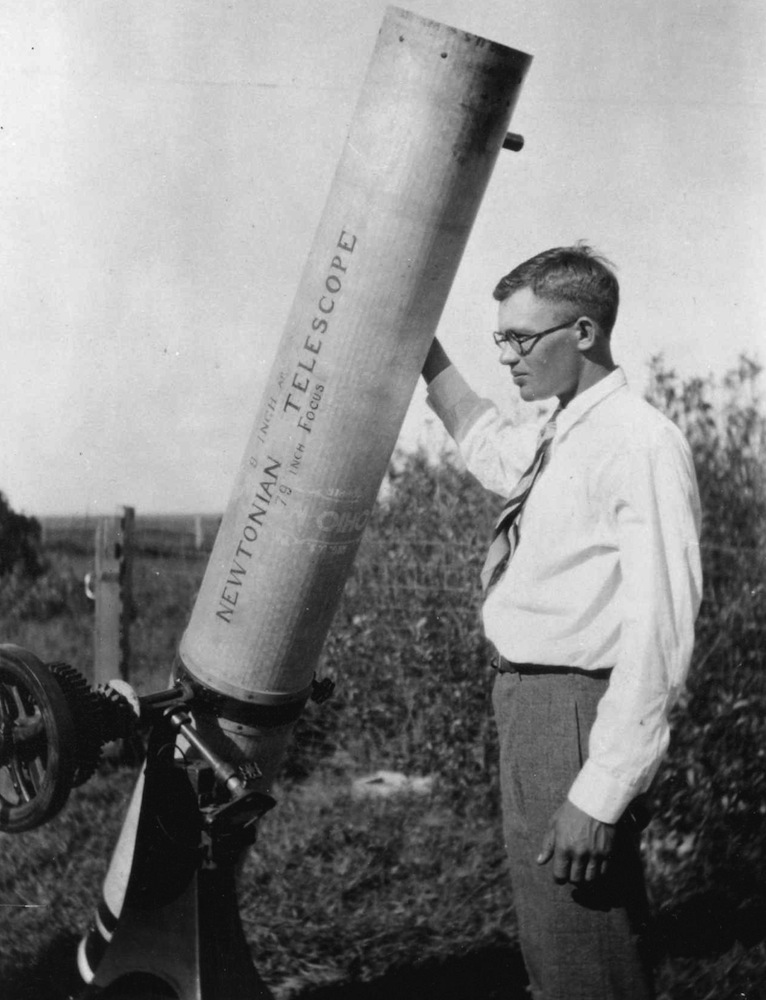When I was in the fourth grade, I became intensely interested in geography and I learned it well.

About Clyde Tombaugh
Clyde William Tombaugh was an American astronomer. He discovered the ninth planet Pluto in 1930, the first object to be discovered in what would later be identified as the Kuiper belt.
Tags
More quotes from Clyde Tombaugh
A person that much interested in science is going to neglect his social life somewhat, but not completely, because that isn’t healthy either. So one has to work it out according to one’s own inclinations, how one wants to proportion these things.
American astronomer (1906-1997)
That’s the way I got along in life. I don’t ever remember being particularly jealous of anybody, because I figured if I can’t do it myself, I don’t deserve to get it.
American astronomer (1906-1997)
It was depressing, very depressing. I worried about how I would make a living. I didn’t want to stay on the farm. It didn’t offer the challenge I wanted and yet, without a college education, I felt that I was really out of luck.
American astronomer (1906-1997)
I guess they just took it for granted that that was what I was interested in and let nature take its course.
American astronomer (1906-1997)
I shed many a tear when the steam engines went out of style on the railroads. I’d like to seem them come back, but I realize the diesels are more efficient.
American astronomer (1906-1997)
I thought I’d better check this third plate, which is another date, see if there’s an image there in the right place that would be consistent with the images on the other plates. That was the final proof.
American astronomer (1906-1997)
You have to compete with others in the field. Sometimes the competition gets pretty fierce because you’re competing for funds or grants to do your work, the financial work.
American astronomer (1906-1997)
I used to believe there were people on Mars, and of course now we know there aren’t. Mars held particular interest. I was curious what kind of beings they would look like.
American astronomer (1906-1997)
We were suddenly faced with the necessity of training a lot of young men in the art of navigation.
American astronomer (1906-1997)
I have a lot of sympathy for young people because I realize how disturbed I was. How would I deal with life in the future? What would I do for a living?
American astronomer (1906-1997)
I guess the two things I was most interested in were telescopes and steam engines. My father was an engineer on a threshing rig steam engine and I loved the machinery.
American astronomer (1906-1997)
Can you imagine young people nowadays making a study of trigonometry for the fun of it? Well I did.
American astronomer (1906-1997)
By the time I was in sixth grade I could bound every country in the world from memory.
American astronomer (1906-1997)
I think the driving thing was curiosity about the universe. That fascinated me. I didn’t think anything about being famous or anything like that, I was just interested in the concepts involved.
American astronomer (1906-1997)
You wonder about it and wonder how will I make an instrument that can handle this kind of a problem.
American astronomer (1906-1997)
The planets are never the same twice, they’re always different, so they could compare the markings I had drawn with their current photographs and they knew that I was drawing what I was really seeing and it wasn’t copied from somewhere.
American astronomer (1906-1997)
When I was in the fourth grade, I became intensely interested in geography and I learned it well.
American astronomer (1906-1997)
I realized that I would have some very tough sledding, and I was very discouraged because I didn’t see much hope of getting into the field I wanted to get into with no college education.
American astronomer (1906-1997)
How does a pansy, for example, select the ingredients from soil to get the right colors for the flower? Now there’s a great miracle. I think there’s a supreme power behind all of this. I see it in nature.
American astronomer (1906-1997)
I was always looking ahead. I used to do all kinds of things for entertainment. When I was young, we had no radio, no TV. We were 30 miles from the public library, out in the sticks in Western Kansas, and so I’d do arithmetic exercises.
American astronomer (1906-1997)
I think there’s a supreme power behind the whole thing, an intelligence. Look at all of the instincts of nature, both animals and plants, the very ingenious ways they survive. If you cut yourself, you don’t have to think about it.
American astronomer (1906-1997)
Unfortunately, a lot of the concepts in the Bible are based on ancient mythology that doesn’t fit the findings of science.
American astronomer (1906-1997)
I used to think about how nice it would be to visit the planets. Of course, I didn’t expect to see in my lifetime what has happened. I knew it would happen some day, but it came along faster than I at first thought.
American astronomer (1906-1997)
Although my early equipment was very modest, later I made my own and they were more powerful.
American astronomer (1906-1997)
I was interested in telescopes and the way they worked because I had an intense desire to see what things looked like, so I learned how to use telescopes and find things in the sky.
American astronomer (1906-1997)
What you do is, you have your drawing board and a pencil in hand at the telescope. You look in and you make some markings on the paper and you look in again.
American astronomer (1906-1997)
To me, the noise of a threshing machine is better music than a lot of music I hear nowadays. I took a man’s place in the threshing crew when I was only 14 years old.
American astronomer (1906-1997)